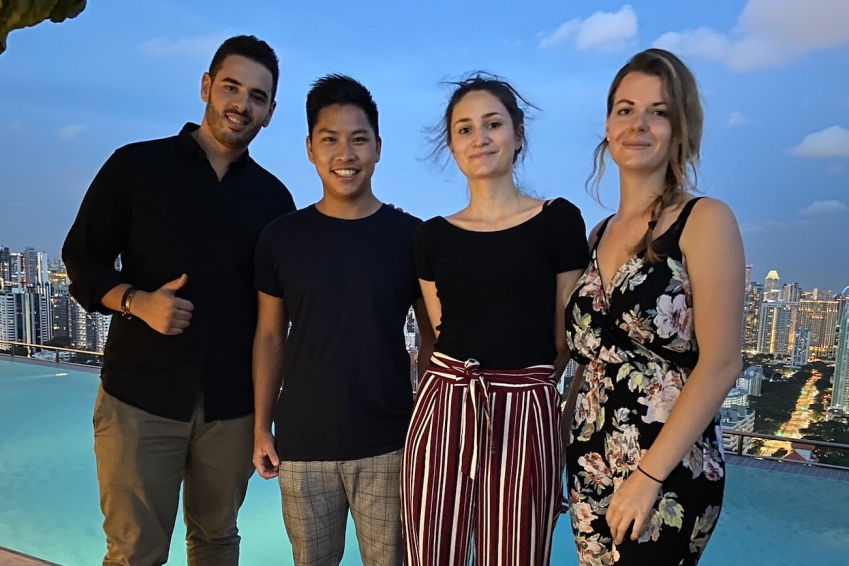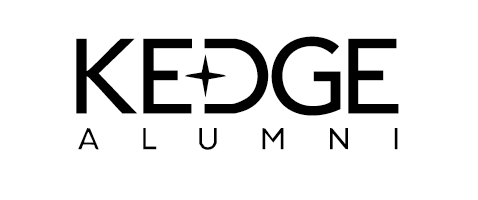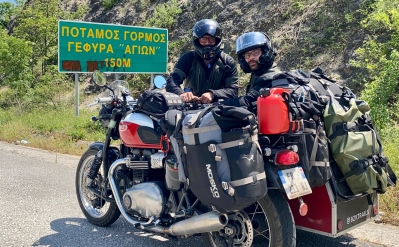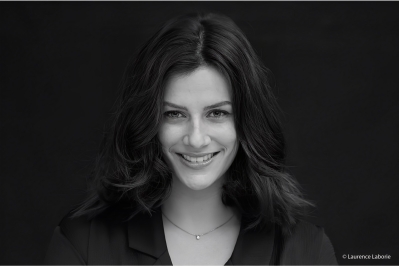News

Interview with Salim, a KEDGER Living in Singapore
The students of the “KEDGE Alumni Travel” pro-act in Asia are currently in Singapore, where they’re meeting with our alumni living abroad.
Graduation Year: 2015
Position: South East Asia Purchasing Coordinator
Company: LEGRAND GROUP
Time Abroad: 1 year and 6 months in Singapore
INTERVIEW:
Can you introduce yourself briefly?
Hello, my name is Salim Mesri, I’m 30 years old and have been living in Southeast Asia, in Singapore, for over a year and a half. I work for Legrand Group, a global specialist in electrical and digital building infrastructures, as Purchasing Coordinator for Southeast Asia (Singapore, Malaysia, Indonesia, Thailand, Philippines, Vietnam, Myanmar, and Cambodia). My role involves coordinating purchasing synergies across countries and leading strategic projects aligned with the Group’s objectives.
Can you tell us about your academic background and why you chose the MSc at KEDGE?
After earning my science-focused high school diploma, I hesitated between two paths because I have a scientific/mathematical profile. Traveling was a key factor for me, and I had to choose between continuing in science or shifting toward business, which offers more opportunities to explore the world.
I first completed a DUT in Business and Administration, then took the opportunity to do an Erasmus exchange in the Czech Republic. That one-year international experience was my first time abroad and allowed me to discover Europe. It was incredible and, honestly, it was a turning point. I realized I wanted to work internationally and that I was passionate about travel.
After that, I returned to France to complete a Bachelor's in Management at IAE Toulouse. Then I pursued a Master’s in International Purchasing at KEDGE Business School, along with an internship in procurement at Thalys International in Brussels. The internship went very well, and they offered me a position, but I wanted to finish my master’s. I negotiated a gap year with the school, allowing me to extend the internship into a fixed-term contract. After Brussels, I completed my second year of the master’s program in a work-study format at Legrand, where I was a project manager for corporate travel solutions. My mission was to manage the Group’s travel portfolio, which represents several million euros.
You’ve visited dozens of countries — was that a job requirement or a personal choice?
I wouldn’t call it a “requirement”; I’d say it was a choice — even a strong personal desire. I’ve always loved traveling, and my Erasmus experience in the Czech Republic only deepened that passion. So naturally, when I had the chance to take on roles that involved travel, I seized them.
However, not all my travels were work-related. I also traveled solo or with loved ones — especially during my Erasmus year, when I explored Central Europe (Germany, Slovakia, Austria, Hungary, Poland…), and while in Brussels with Thalys, I visited Northern Europe (Scotland, Denmark, Amsterdam, Luxembourg, Belgium…).
Later, I joined Legrand in France and traveled for work to places like Italy. During my VIE in the United States, I visited Mexico and Canada. Now, in Southeast Asia, I’m exploring the region’s countries…
With each professional experience, I make the most of the opportunities and add personal trips to discover nearby cultures and landscapes.
How did you end up in Singapore, and how do you feel about living there?
After my VIE in the U.S., I had two options: stay in the U.S. or return to France to work on a project at the Group’s purchasing department, with the possibility of going to Southeast Asia later. I chose to return to France, and after a year working on an organizational project, I was offered a position in Southeast Asia. Initially, I was supposed to go to Kuala Lumpur, but for various reasons, the assignment ended up being in Singapore. That’s how I arrived here.
I genuinely feel good here. I think Singapore is a place you either love or dislike. I’m among those who really enjoy it — it’s super efficient, everything is fast, clean, and well-organized. Everything is simple: admin tasks, getting around, eating, and exploring. The airport is a technological gem. When I return from trips, it takes me five minutes from the plane to the taxi because, as a resident, I have access to an automated lane and don’t need to go through immigration — a huge advantage since I travel often.
Singapore offers a great balance in my opinion: it’s a tech-forward city, very multicultural, the climate is pleasant, the food is great, it’s extremely safe, and it’s centrally located near many beautiful countries full of culture and nature.
That said, I understand how the city’s “too perfect” or superficial side might put some people off. I’ve been here for a year and a half, and while I really like it, I’m reaching a point where I wouldn’t mind staying another two or three years, but I’m also open to moving on to a new sector and geography… Like anything, you eventually feel like you’ve seen it all.
If I were to recommend Singapore, I’d say it’s ideal for a two-to-three-year stay — unless you’re with family, in which case it’s different. You can truly settle down and offer your family an amazing quality of life in terms of safety, education, and comfort. However, let’s be honest: Singapore’s business model is built around creating an artificial paradise for those who can afford it. For people wanting to raise a family here but struggling financially, it’s more complicated. On the other hand, if you can afford it or work for a company that helps cover housing, healthcare, and education, Singapore is the perfect city in my opinion!
What are your plans for the future? Do you think you’ll stay here much longer?
As mentioned earlier, I’ve now been in Singapore for a year and a half, and I plan to complete my second year here. Also, the “Employment Pass” operates on a two-year cycle. Generally, at the end of those two years, you evaluate whether you want to renew the visa with your current employer, switch to another, or not renew it at all and move on to new horizons. For me, these two years in Singapore represent a pivotal period, but at this stage, I’m still unsure whether I’ll stay or move to another country.
There comes a time when you can say whatever you want — and I was the first to say: “France is complicated when it comes to work, hierarchy, etc… you have to go work elsewhere.” But after working across several continents, I’ve realized that eventually, you start to feel a pull — a need to reconnect with family and friends. So I think after two years in Singapore, there’s a good chance I’ll return… unless I’m offered an opportunity I simply can’t refuse!
Do you have any advice for graduates and future graduates who want to move to Singapore?
My general advice is that nothing in life is set in stone. So don’t stress yourself out with pressure like “Which Master’s should I choose? What specialization?” as if your entire life depends on it. Of course, if you want to work in finance, a Master’s in finance will help. If you want to work in marketing and you studied law, it might be harder than if you had studied marketing — but still, nothing is set in stone. Opportunities are created. All it takes is meeting the right person who values your profile and your work ethic, and you’ll get an opportunity, even if it’s outside your field of study.
So don’t build mental barriers. It’s healthy to plan ahead, give yourself the means to succeed, and try to make the right choices for your future — but don’t let it paralyze you.
In my opinion, what really matters are soft skills — curiosity, resourcefulness, active listening — and your ability to learn. Beyond your academic background and experience, it’s your mindset and pragmatic, proactive attitude at work that will help you grow professionally. Your degree is a ticket to access a network and interviews, but once you’re in the company, it’s not what will define your career or your life.
Another piece of advice: it’s important to scout the country where you want to live and work. Personally, I had already traveled through Southeast Asia before moving to Singapore. I had explored the region (Kuala Lumpur, Jakarta, Singapore, Thailand…) during a solo trip, so I knew it was an area I was interested in. That trip even gave me a completely different perspective than I had before leaving.
For example, I had read that Singapore was a city full of restrictions and rules, and I imagined it as an open-air prison. But in the end, it turned out to be more like an open-air oasis for me. So it’s essential to confront your ideas with reality and make decisions based on that. I was lucky to have taken that trip, so when I was told the assignment would be in Singapore instead of Kuala Lumpur, it wasn’t a problem — I already knew both cities.
One more piece of advice I’d like to share: Travel! Honestly, no need for long speeches — just travel. Get out of your comfort zone, take the leap, stop overthinking, and stop stressing over small details. We live in a world where traveling is easy. Buy a plane ticket, go left, go right — you’ll have both good and bad experiences, but what’s important is that it will help you grow and evolve in how you see the world.
Traveling, seeing the world, talking to people, opening your mind — these are essential, especially in today’s world. Don’t stay in your bubble, because there may come a time when you’ll regret not doing things differently. And when you’re older, with more responsibilities, it might be harder to take that leap.
Finally, the most important advice I can give: invest in yourself. See every new experience as an opportunity to grow personally more than materially — the rest will follow.
Interview conducted in Singapore by Clémence, Stivell, Estelle, and Adel, students of the KEDGE Alumni Travel pro-act in Asia.
TO LEARN MORE ABOUT THE KAT PROJECT
FOLLOW THEM ON INSTAGRAM
FOLLOW THEIR ADVENTURES ON FACEBOOK






